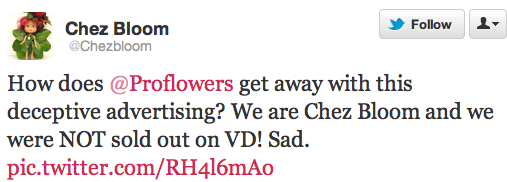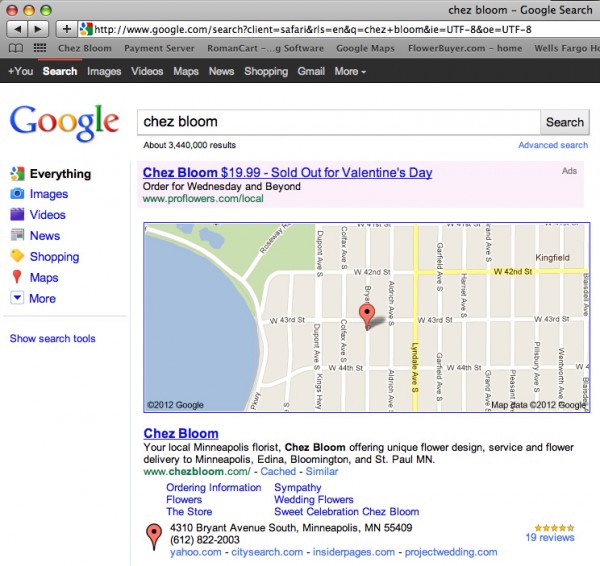Valentine’s Day AdWords “War” Among Florists Highlights Another Google Challenge
Imagine searching on your own company’s name and finding a competitor’s ad that said you were “Sold Out” right on your business’ most important holiday. That’s what florists like the owner of Chez Bloom in Minnesota had happen, as originally reported by Brand Channel. Indeed, as the owner of Chez Bloom Laura Chase told BrandChannel, […]
Imagine searching on your own company’s name and finding a competitor’s ad that said you were “Sold Out” right on your business’ most important holiday. That’s what florists like the owner of Chez Bloom in Minnesota had happen, as originally reported by Brand Channel. Indeed, as the owner of Chez Bloom Laura Chase told BrandChannel, she searched for a lot of other local flower shops, and found them “Sold Out” — at least in AdWords ads — as well.


Jen Caroll, a spokesperson for the AdWords advertiser in question, ProFlowers, said that the situation was inadvertent. Here’s the statement she gave to BrandChannel:
“It turns out that the ad in question was part of a Google ad campaign of ours to advertise that OUR flowers (ProFlowers) were sold out for Valentine’s Day, but we could still accept orders for Wednesday and beyond. Our marketing team bids on tens of thousands of floral-related keywords and keyword combinations which trigger ads to appear in search results pages. An unintended consequence is that search engine matching technology, run by Google in this case, inputs the searched-upon keyword (e.g., “bloom”) into the ProFlowers ad. The fact is our team entered the “sold out” descriptor for ProFlowers’ products—not for the florist’s. Because we have a dedicated team closely monitoring our social media channels, as soon as we became aware of the unintended consequence we worked immediately with our search engine providers to rectify the problem.”
The technology referred to in this case is Google’s Keyword Insertion capability for advanced users. Advertisers create a single ad for a list of keywords, placing this code — {keyword:default text} — in the place where they’d like the user’s search term to be auto-populated. In this case, keywords for the names of competitors, including Chez Bloom, were apparently used in the list of keywords to be auto-populated. Instead of terms like “Flowers” appearing before the “Sold Out” descriptor, the competitor’s name appeared instead.
Though bidding on competitors’ trademarked keywords, and even using them in ad text, are fair game on Google, the company does have policies preventing false or misleading ad copy. According to a spokesperson, “Google allows advertisers to bid on competitor keywords as well as to use competitor terms in the ad text itself as long as advertisers do not make any false or inaccurate claims in their ads (see more here). We use a combination of manual and automated processes to enforce this policy. Ads that are found in violation of our policies will be removed.”
Indeed, the ads were removed later on the same day that ChezBloom noticed the problem. But that didn’t keep florists from being up in arms — because Google is supposed to be reviewing the ads before they’re displayed. Florist Catherine Hillen-Rulloda, of Avante Gardens in Anaheim, Calif., wrote a particularly scathing blog post:
First, we had ProFlowers telling shoppers seeking local florists BY NAME in Google searches that the stores were sold out of flowers. It’s a completely despicable ad tactic that diverted consumers by lying about local flower shop inventories. Despite having plenty of beautiful blooms for Valentine’s Day, the drop-shipper tried to suck in late buyers by falsifying the flower availability at these shops. Shame on Liberty Media. Shame on ProFlowers. And shame on the Google staffers who approved those ads.” [emphasis in the original text]
The situation highlights the challenges that Google has in policing its AdWords ads for compliance — with its own policies, with legalities in various jurisdictions around the world (see: $500 million settlement regarding illegal pharmacy ads) including trademark and copyright laws.
Related stories
New on Search Engine Land